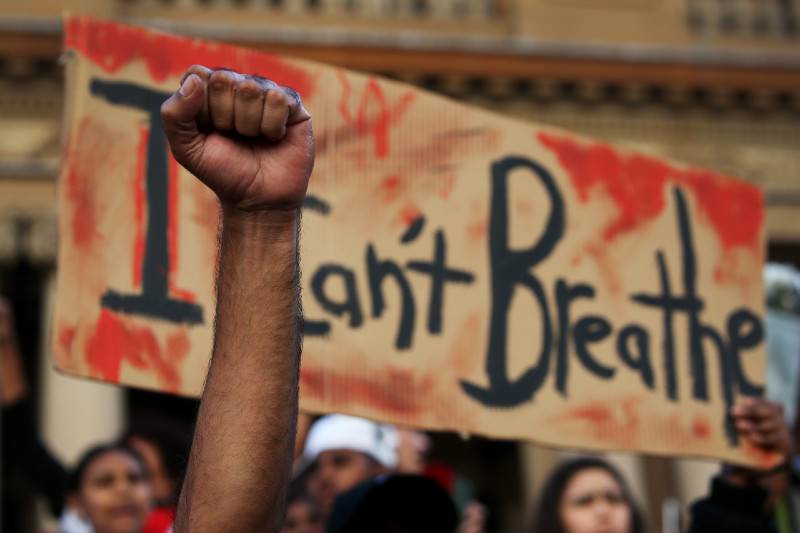Extract from Eureka Street
- Kate Galloway
- 11 June 2020
In the 1982 High Court decision of Neal v The Queen, Percy Neal appealed his sentence of six months imprisonment with hard labour for serious assault. Mr Neal, an Aboriginal man who subsequently became the mayor of Yarrabah near Cairns in Queensland, had spat at Mr Collins, the manager of the local store, following an argument.

The magistrate had described Mr Neal as an ‘aggressive agitator’, and in what Justice Murphy later described as a political statement, continued:
‘I can say unequivocally that the majority of genuine Aboriginals (sic) do not condone this behaviour and are not desirous in any shape or form of having changes made. They live a happy life, and it is only the likes of yourself who push this attitude of the hatred of white authority, that upset the harmonious running of these communities.’
The High Court overturned what it found to be an excessive sentence. Of interest, especially in light of the current peaceful protests around Australia as part of the Black Lives Matter movement, is the context for Mr Neal’s actions. Justice Murphy described these in some depth — characterising the matter as a ‘race relations case’.
‘The evidence showed that Mr Neal and his fellow Aborigines (sic) at the Yarrabah Community have a deep sense of grievance at their paternalistic treatment by the white authorities in charge of the Reserve, including Mr Collins. The Council and Aboriginal members of the Community had no control over what was sold at the store under management of Mr Collins. The evidence… was that although Mr Neal complained that Mr Collins sold rotten meat, Mr Neal and the Aboriginal Council were powerless to do anything about it, apart from making representations to departmental officers.’
The Neal decision is an example of the over-reaction of the law to ostensibly minor actions taken by Aboriginal and Torres Strait Islander peoples that inevitably lead to the disproportionate incarceration of Indigenous people. But it also speaks to the daily experience of many Indigenous communities.
This was a point made at the 7th June Cairns Black Lives Matter protest. Terry O’Shane, a member of the North Queensland Land Council board, pointed out to the crowd that Black Lives Matter was about much more than deaths in custody — as important as that issue was. He reminded those present that we stand on stolen land. That the country is profiting from the free labour of Aboriginal and Torres Strait Islander peoples — in mining, pastoralism, the pearling industry, and infrastructure — the labour of all those who never came home.
'Aboriginal and Torres Strait Islander peoples already bear an "unnecessary and unacceptable risk". This risk is so bad, and government is so intent on ignoring it, that communities have taken to the streets.'
He said that Black Lives Matter is not just about incarceration rates. It’s everywhere.
This was the point missed by Senator Mathias Cormann on Sunday when he described those ‘recklessly’ attending demonstrations as ‘incredibly selfish…incredibly self-indulgent’. He asserted that attendance at protests imposed ‘unnecessary and unacceptable risk on to the community’.
The reason that protests are occurring in Australia — and around the world — is a persistent and abject failure in governance that represents not just an issue for particular individuals, but an issue for society as a whole. Aboriginal and Torres Strait Islander peoples already bear an ‘unnecessary and unacceptable risk’. This risk is so bad, and government is so intent on ignoring it, that communities have taken to the streets.
It is not a question of self-indulgence that brought Australian crowds out in their tens of thousands. It is a question of survival for Indigenous people.
Governments have had a choice for a long time, and they had a choice in advance of the protests. It is government that has the power and the capacity to implement the structural change that our society needs so that all might reach their potential. It is government that might have extended an invitation for round table, socially distanced, conversations to work through the solutions to the ongoing struggle experienced by Indigenous people.
Instead we saw only patronising invocations to stay at home.
If our governments fail to roll out frameworks of good governance when times are good, they cannot expect to have the trust of the people during a crisis. So long as Australia fails to enter into proper legal relations with Aboriginal and Torres Strait Islander peoples, we will see protests, and ‘agitators’ will continue to call for justice. Justice Murphy observed in Neal v The Queen:
‘As Wilde aptly pointed out in The Soul of Man under Socialism,
“Agitators are a set of interfering, medding people, who come down to
some perfectly contented class of the community and sow the seeds of
discontent amongst them. That is the reason why agitators are so
absolutely necessary. Without them, in our incomplete state, there would
be no advance towards civilisation.” Mr Neal is entitled to be an
agitator.’
And so are we all. Kate
Galloway is a legal academic with an interest in social justice. She is
presently associate professor of law at Griffith Law School.
Kate
Galloway is a legal academic with an interest in social justice. She is
presently associate professor of law at Griffith Law School.
No comments:
Post a Comment